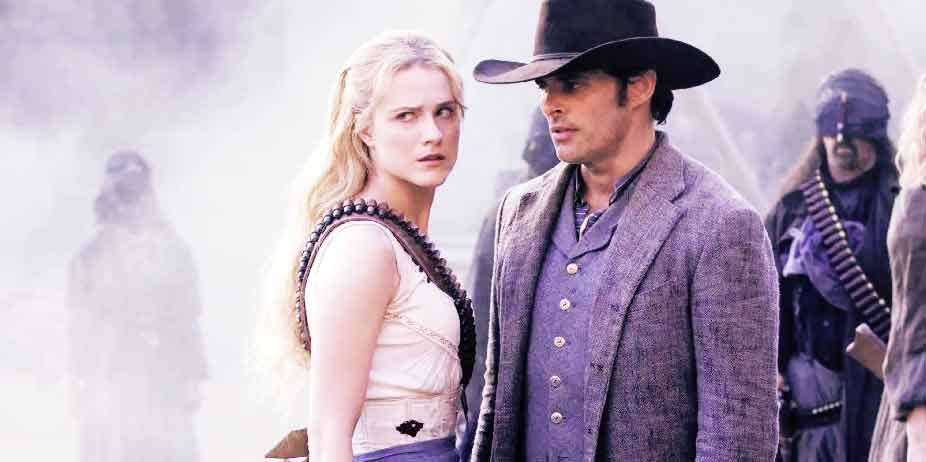Westworld, Season One (2017)
It's a shame the most interesting philosophical-leaning programs come with the most offensive content; Westworld is an "exploration of the origins of sin," an analysis of human nature at its fundamental core, a story of awakening, and a futuristic Frankenstein, as it explores the concepts of life and finding its meaning; it's also a subtle criticism of faith, and possibly an allegory about creation, exploration, and abandonment.
Dolores (Evan Rachel Wood) lives the same life every day, but does not know it. She goes into town, buys groceries at the small general store, drops a tin can (which someone picks up and hands back to her), then goes home and finds her life torn apart. Bandits, robbers, or the man in black (Ed Harris) have murdered her parents, and drag her into the barn to rape her. She screams. She fights. She mourns. And she wakes up the next day with no memories, and it all happens over again. It's part of her loop, and she is the brain-child of the brilliant but detached Dr. Robert Ford (Anthony Hopkins) and his dead genius partner, Arnold.
She lives in Westworld, a surreal park populated by robots programmed to provide an outlet for human visitors to the old west. Here, the rich and famous can indulge their fantasies without real-world consequences; they can become a bank robber, be involved in a hold up, rescue a damsel in distress, bed a comely whore, or fight off the Indians. Families can say close in to the main town, but the more adventurous souls, such as Logan (Ben Barnes) and his rather disgusted friend William (Jimmi Simpson) venture out; the further you go, the rougher it gets, the more chances you have to become a hero, a villain, and push the limits of what you can take. You can inflict all the physical harm you want on the "hosts" (robots) but they can't kill or maim you. They can't even swat a fly.
But something is happening at Westworld, which draws the attention of an engineer, Bernard (Jeffrey Wright)... some of the hosts seem to be falling out of their loops. And as the day draws to a close, Dolores crushes a fly.
If not for the constant bombardment of foul language and naked bits, I'd have considered Westworld a profound if somewhat cynical reflection on evil; it chronicles the awakening of consciousness and the loss of innocence through Delores, but also in another character whose true intentions are revealed toward the end. It asks the audience to ponder the meaning of life, whether humans are at their core good or evil, the morality of robots created to act as our playthings, and acts as a mirror to the main characters, as Westworld forces each of them to confront their true self. It's a complex story full of twists, turns, and sinister events, which also emotionally invests you in the characters. The acting is splendid, the costumes and set design wonderful, and it never becomes dull even when a character is stuck in a loop. The hour and a half finale packs a hard punch as it casts new light on all the former episodes, and causes you to see them with new eyes.
And yet, as I averted my eyes from so much nudity, I could not help but think of the recent sex scandals in Hollywood; actors and actresses told to strip for the camera, expose themselves for their five minutes of fame or to further their careers. I realize the superficial intent behind it (to show how the humans have so little respect for the robots, they do not even give them the dignity of covering them up when working on them) but there's also a more deliberate intent behind it: sensationalism, exploitation, and to remind the audience that this is HBO. Not a single nude scene was necessary to the plot; every one would have worked just as well with the actors partly dressed, with no loss of the horrors of what the robots experience at the hands of their handlers. I try not to be too cynical about the human race, but it's a bit ironic that a show that sets out to remind us what scum human beings are (destroyers of innocence, corrupters of goodness, and abusers of virtue) proves its point through its own deliberate choices.
Sexual Content:
Tons of full-frontal nudity on men and women; whenever
robots are 'in the shop,' they are completely naked (and
stored standing, naked, upright); many scenes take place
with fully nude actors in the foreground, background,
and in action scenes; other scenes have topless women;
one episode features an orgy setting; four graphic sex
scenes; a woman is dragged into a barn and presumed
raped (off-screen); a whore grabs men/women by the
crotch; many humans use the robots for sexual
gratification.
Language:
Hundreds of f-words; Jesus' name is taken in vain a
dozen times (along with GD); general profanities,
insults, derogatory terms for women, and s-words.
Violence:
Blood spatters as human-like robots are mowed down in
gunfire; they turn on humans and beat, skewer, and
batter them to death; lots of violence toward women;
limbs are hacked and blown off; bodies strew streets and
battlefields; people and robots alike are shot in the
head, stabbed in the gut, or have their throats cut.
Other:
The series has the worldview that humans are all scum
and do not deserve to live.

